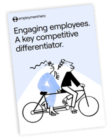Updates to Employment Pass eligibility requirements in 2024
Singapore is tightening its employment visa requirements. Here are the key changes that you need to be across.

Does your organisation currently hire foreign employees in Singapore under the Employment Pass (EP)? If so, these changes are important to know.
Two significant changes have been applied to the eligibility requirements for employees hoping to work or currently working in Singapore under an Employment Pass (EP) — one of which came into effect in 2022, while the other will come into effect in 2023.
What is the Employment Pass (EP) in Singapore?
The Employment Pass (EP) is essentially a work visa that allows foreign professionals, managers and executives to work in Singapore, if they meet the eligibility criteria.
What is the qualifying salary for an EP?
Candidates need to earn at least $5,000 a month, which is benchmarked against the top one-third of the local professional, managers, executives and technicians (PMET) salaries by age. This number increases progressively from age 23, up to $10,500 at age 45 and above.
This minimum EP qualifying salary applies to all sectors except the financial services sector, where candidates need to be earning at least $5,500 a month instead of $5,000. Similarly, this number increases progressively from age 23, up to $11,500 at age 45 and above.
For first-time candidates, the EP will be valid for up to two years. And for those renewing their EP, it will be valid for up to three years. Experienced tech professionals with skills that are currently in short supply in Singapore may be eligible for a longer five-year pass.
Who can apply for an EP?
Only an employer or authorised third party can apply for a candidate’s EP. If you are an overseas employer that does not have a registered office in Singapore, you will need a Singapore-registered company to act as a local sponsor and apply on your behalf.
The most important part of the EP application that employers must be aware of is the advertisement requirements. In efforts to promote fair employment practices and improve labour market transparency, the Ministry of Manpower (MOM) has put in place a list of advertising criteria employers need to fulfil.
All employers are subject to the Fair Consideration Framework, and expected to adhere to the Tripartite Guidelines on Fair Employment Practices.
Employers submitting EP applications must first advertise the job on MyCareersFuture and leave applications open for at least 14 consecutive days, to provide ample time for job seekers to view and apply for the vacancy (exemptions apply). This is to ensure that employers have considered all candidates fairly before an EP application can be approved.
Key changes to Employment Pass requirements

Increases to the EP qualifying salary
Since 1 September 2022, first-time EP candidates have had to meet a higher qualifying salary to be eligible for an EP. These new salaries will apply to EP renewals from 1 September 2023.
For those working in non-financial services sectors; the minimum qualifying salary has increased from S$4,500 to S$5,000. As for those working in the financial services sector, the minimum qualifying salary has increased from S$5,000 to S$5,500. As mentioned above, the minimum qualifying salary increases progressively with age.
Introduction of points-based Complementarity Assessment Framework (COMPASS)
From 1 September 2023, EP candidates must pass a two-stage eligibility framework to qualify for an EP. In addition to meeting the EP qualifying salary mentioned above, candidates must pass a points-based Complementarity Assessment Framework (COMPASS).
Applications are awarded points on four foundational criteria, if they meet or exceed expectations. It is based on a set of individual and firm-related attributes — individual attributes are aspects such as ‘Salary’ and ‘Qualifications’, and firm-related attributes are aspects such as ‘Diversity’ and ‘Support for Local Employment’.
They may also earn extra points under the bonus criteria if the application meets the relevant qualifying conditions.
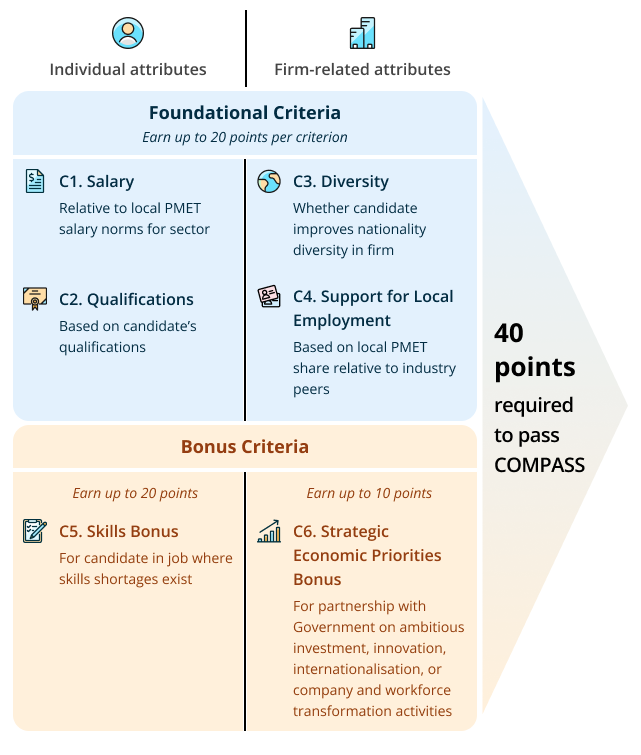
40 points are required to pass COMPASS — you can refer to the Ministry of Manpower’s website for more details and case studies on how the scoring system works.
Exemptions from COMPASS include:
- Candidates who earn at least $22,500 in fixed monthly salary;
- Candidates who are applying as an overseas intra-corporate transferee under the World Trade Organisation’s General Agreement on Trade in Services or an applicable Free Trade Agreement that Singapore is a party to; or
- Candidates who are filling a role on a short-term basis of one month or less.
All EP renewals will be subject to the COMPASS framework from 1 September 2024.
Are current EP holders affected?
Current EP holders will not be affected by the new changes at the moment, but will eventually be subject to these changes when their EP is up for renewal.
The Ministry of Manpower has implemented a progressive timeline to give employers ample time to adjust and prepare for the changes:
| Changes | New applications | Renewals |
| Higher qualifying salary | From 1 Sep 2022 | From 1 Sep 2023 |
| Introduction of COMPASS | From 1 Sep 2023 | From 1 Sep 2024 |
Why is the Singapore government implementing these changes?
These changes are aimed at enabling employers in hiring highly-skilled foreign professionals — improving Singapore’s workforce diversity while building a strong Singaporean core.
Having a transparent system with clear eligibility criteria and guidelines also provides businesses with greater clarity and certainty about manpower planning.
As mentioned by Manpower Minister Tan See Leng, “We know that the labour market for skilled workers is sufficiently tight. So this latest move is not intended as a tightening measure. Instead, it is part of MOM’s regular updates to ensure that our qualifying salaries keep pace with local wage growth, so foreigners are not coming in just because they are cheaper than local PMETs.”
April 2023 updates regarding COMPASS
2 key updates were released by the Ministry of Manpower (MOM) with regards to the bonus criteria in the Complementarity Assessment Framework (COMPASS).
1. Skills Bonus: Shortage Occupation List (SOL)
The Shortage Occupation List (SOL) was recently published, which identified 27 occupations with a dearth of talent in Singapore. EP applicants under this criterion will get bonus points towards their total Complementarity Assessment Framework (COMPASS) score for EP applications.
The SOL was put together by the Ministry of Manpower (MOM) and the Ministry of Trade and Industry, in consultation with sector agencies and tripartite partners.
Occupations identified for the SOL were based on:
- Their strategic importance to Singapore’s economic priorities;
- The degree and nature of labour shortage; and
- The sector’s commitment to developing the local pipeline to address these shortages in the medium term.
The SOL covers six industries in total – agritech, financial services, green economy, healthcare, infocomm technology (IT) and maritime. The full list of occupations are as follows:
| Shortage Occupation List (SOL) | |
| Agritech |
|
| Financial services |
|
| Green economy |
|
| Healthcare |
|
| Infocomm technology |
|
| Maritime |
|
These occupations may be added or removed from the SOL on an annual basis, to ensure Singapore’s responsiveness to market conditions. The list will also be reset every three years to avoid entrenching dependencies, and any updates made to the list will be published in March on an annual basis.
EP applicants under the SOL will be eligible for a total of 20 bonus points. However, if one-third or more of the staff at their hiring firm is of the same nationality as them, they will only be eligible for half of the bonus points (10 points). This is to ensure that diversity is retained in firms.
EP applicants who depend on the SOL bonus points to reach the 40 points needed to pass the Complementarity Assessment Framework (COMPASS) will have verification checks on their experience and qualifications. They will also not be allowed to be redeployed to another job role, without a reassessment of their work passes.
2. Strategic Economic Priorities Bonus
The Strategic Economic Priorities Bonus (SEP Bonus) is the bonus criteria for firms under the COMPASS framework, which grants up to 10 points for applicants applying to work in firms recognised as important economic contributors.
To be considered for the SEP Bonus, firms must participate in one of these eligible programmes, and show commitment to developing the local workforce or ecosystem.
These programmes are run by the Economic Development Board, Enterprise Singapore, the Maritime and Port Authority, the Singapore Tourism Board and the National Trades Union Congress.
The SEP Bonus will be awarded at the discretion of the supporting agencies running the relevant programme — firms that have been awarded the SEP Bonus will be notified by MOM by end July 2023.
Additional details released regarding COMPASS
1. Qualifications (C2)
Candidates will be able to earn points based on their qualifications, as follows:
| Points awarded | Candidate’s qualifications |
| 20 points | Top-tier institutions, such as:
|
| 10 points | Degree-equivalent qualifications, which generally refer to:
|
| 0 points | No degree-equivalent qualifications
|
2. Self-assessment tool
MOM’s Self-Assessment Tool (SAT) will be enhanced to include not only the EP qualifying salary, but also whether an application or renewal request meets the COMPASS criteria. This will help you predict whether your application or renewal request will be successful.
Simply log in to the SAT with your Employment Pass eService account. Then, all you need to do is enter the details of your candidate and their job. The SAT will then tell you whether the candidate can qualify for an EP.
If the SAT says no, the application will likely be rejected, and if the SAT says yes, the application or renewal will likely be approved.
How can employers prepare for these changes to employment passes?
Employers should be aware of the salary rates of their employees on EPs, especially for those which will be up for renewal in 2024.
They should also review their current hiring strategies to continue maintaining a strong Singaporean core, whilst developing a qualified and diverse foreign workforce. This would strongly resonate with the overall theme of complementarity to the local workforce.
How can HR software help you track EP applications and holders?
With so much already on your plate, it can be difficult to keep track of employment law updates like the ones mentioned above. Why not leave the difficult work to us — so you can better focus on the strategic growth of your business?
Employment Hero is an all-in-one HR and payroll software that will give you a peace of mind when it comes to all things HR compliance. Whether you’re hiring new employees or engaging existing ones, our platform will help you leverage automation to streamline processes and save valuable time.
You can store important employee information digitally in one location and manage them seamlessly from anywhere in the world. Check on the EP status of your employees easily by viewing the expiry dates for their EP on their employee profiles.
Keeping track of EP holders doesn’t have to be difficult. With the right tools, it’ll take you minutes rather than hours! Keen to find out more? Speak to one of our employment specialists today.
Additional resources regarding COMPASS you can refer to:
- COMPASS webpage
- Verification of qualifications
- Workforce insights tool
- Self-assessment tool
- MOM’s COMPASS guide
Disclaimer: The information in this article is current as at 12th April 2024, and has been prepared by Employment Hero Pty Ltd (ABN 11 160 047 709) and its related bodies corporate (Employment Hero). The views expressed in this article are general information only, are provided in good faith to assist employers and their employees, and should not be relied on as professional advice. The Information is based on data supplied by third parties. While such data is believed to be accurate, it has not been independently verified and no warranties are given that it is complete, accurate, up to date or fit for the purpose for which it is required. Employment Hero does not accept responsibility for any inaccuracy in such data and is not liable for any loss or damages arising either directly or indirectly as a result of reliance on, use of or inability to use any information provided in this article. You should undertake your own research and to seek professional advice before making any decisions or relying on the information in this article.
Related Resources
-
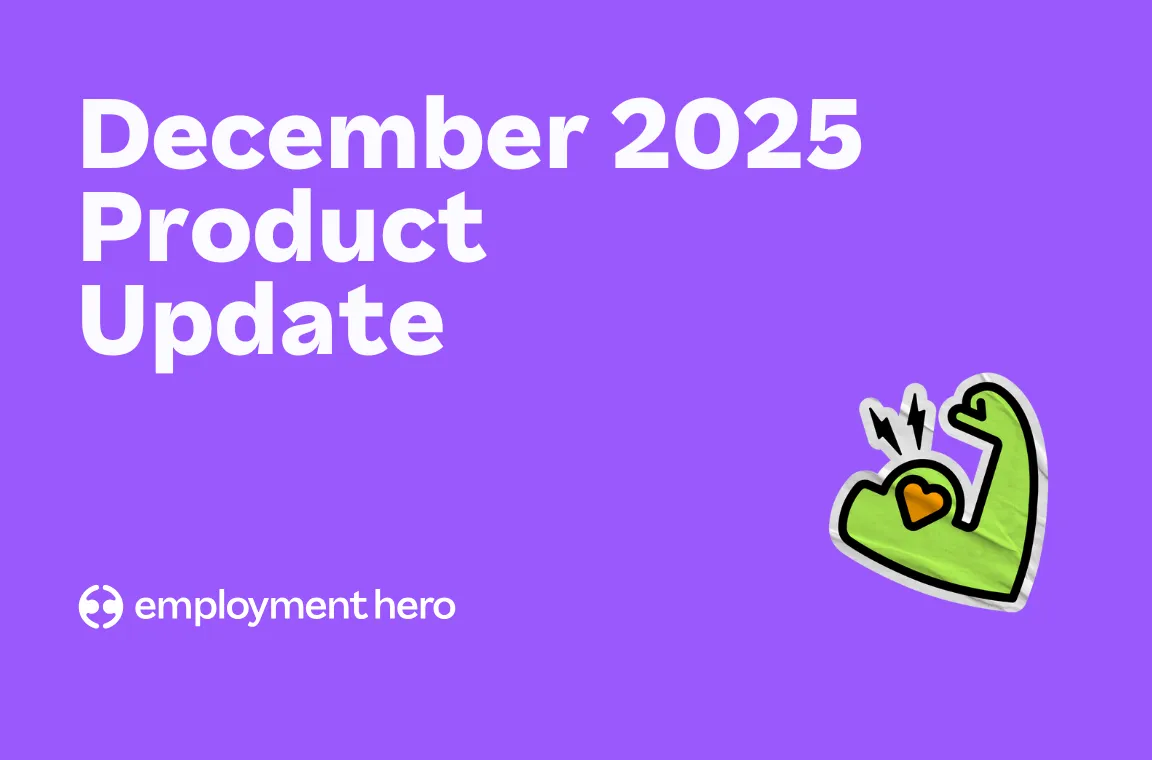 Read more: Product Update: December 2025
Read more: Product Update: December 2025Product Update: December 2025
Welcome to the December 2025 product update from the Employment Hero team. We’ve got lots to share around Custom Forms,…
-
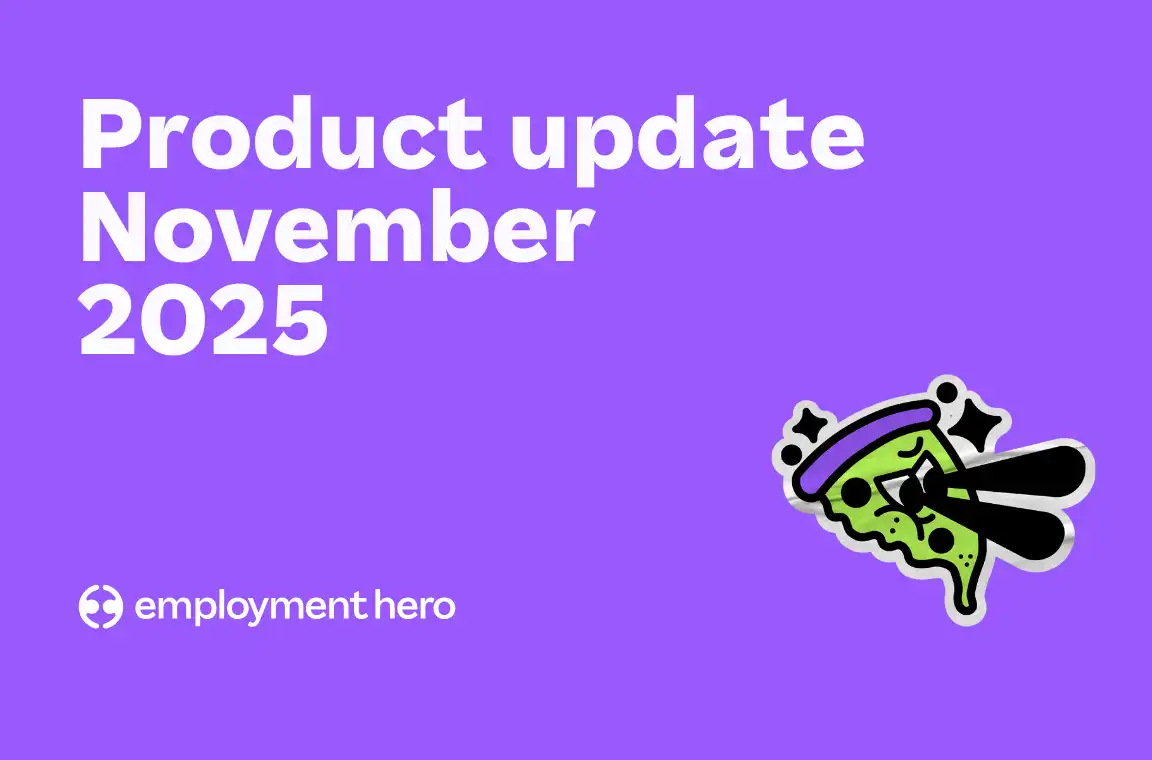 Read more: Product Update: November 2025
Read more: Product Update: November 2025Product Update: November 2025
Welcome to the November 2025 product update from the Employment Hero team. We’ve got lots to share around Workflows, Rostering,…
-
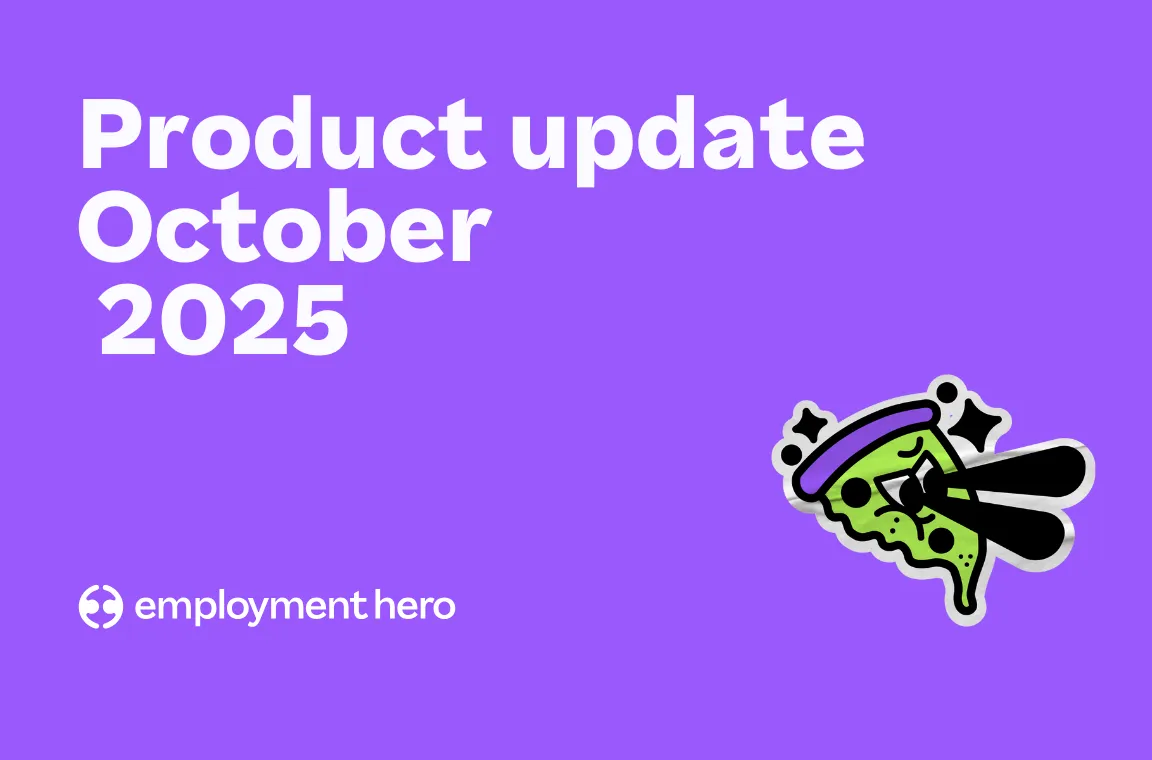 Read more: Product Update: October 2025
Read more: Product Update: October 2025Product Update: October 2025
Our October 2025 update is here for Singapore. Discover OCBC remittance advice, leave balance checks, rostering, timesheets and more. Read…










